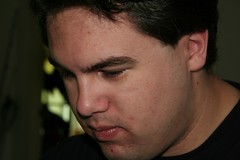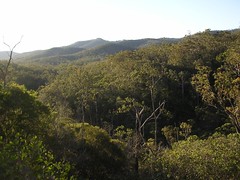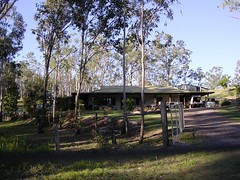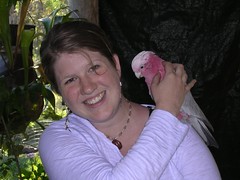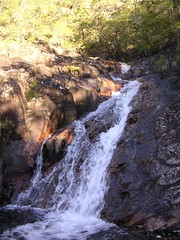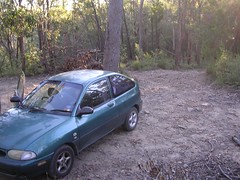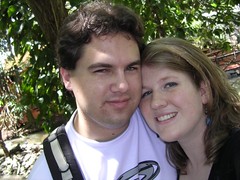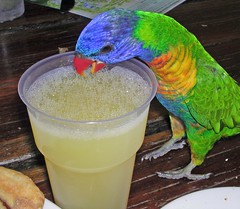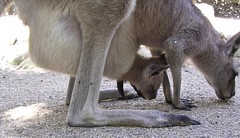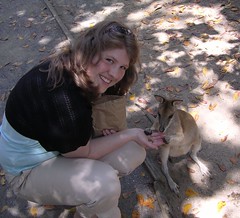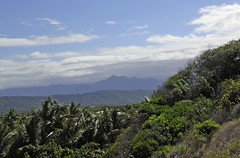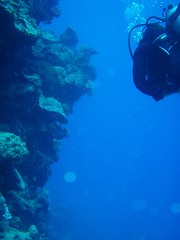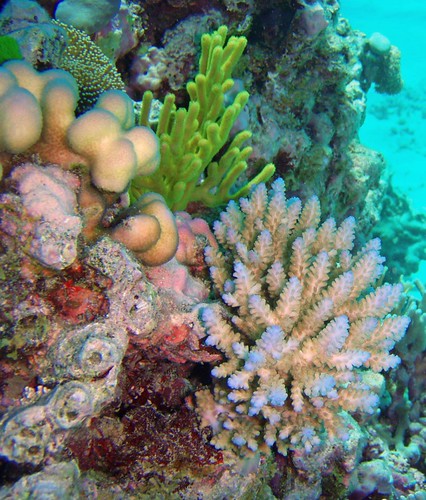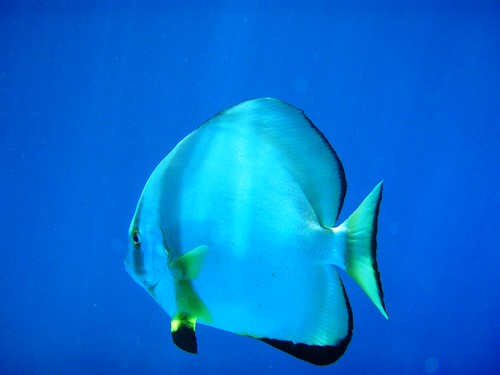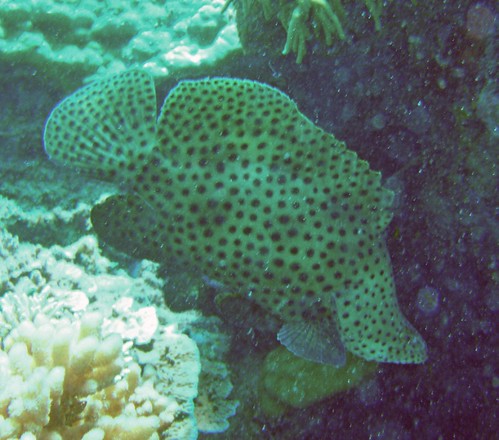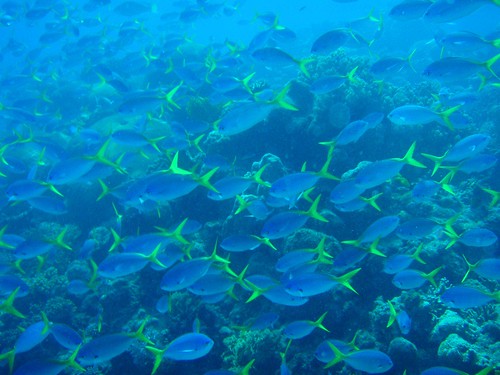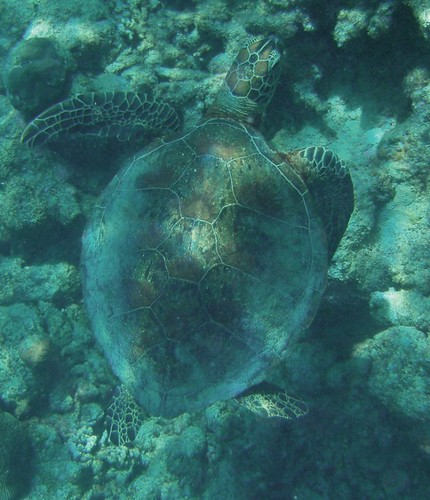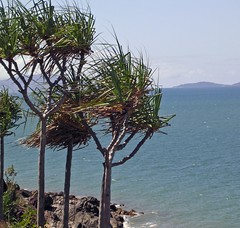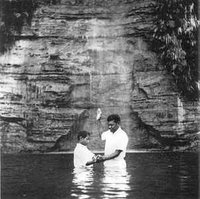
People are physical beings. So many times in the church we argue about meeting peoples' *spiritual* needs (the word "spiritual" usually used with an air of awe and reverence) and forget to meet their physical needs first. The typical example is the missionary going into a city full of starving people and saying "God loves you" without bothering to hand them his sack lunch. The funny thing is, most of the time they don't even say that, they say "you'll burn in hell if you don't repent," to which the starving people say "who cares, we're already there."
The irony in all this is that the church has one part of this right that they fail to extend outwards: ceremonies. Until recently, ceremonies have been acknowledged by the church as useful, even necessary tools in the journey of faith. A ceremony is simply any one-time event using symbols and imagery that marks a time and place as separate, distinct (as opposed to a ritual, which is a repeating event using symbolism, though both achieve the same ends). In the emerging missional movement, there has been a disturbing trend as of late (ironically following a precedent set by the evangelical, mainstream, and house-churches in their effort to be 'hip,' 'relevant,' and ‘seeker-sensitive’) towards the elimination of ceremonies. For example, churches are beginning to downplay the importance of baptism and in some cases, even weddings. To be fair, this is usually a reaction to their predecessors' misuse of baptism as a necessity for "salvation."
In my case, this is to be expected. I grew up in a church that practiced baptism by sprinkling. Due to other circumstances I ended up moving to a non-denominational church that practiced baptism by immersion. All was going well until the church told me that because I had not been baptized by immersion (they didn't go so far as to say only THEIR immersion), I was not a Christian. They had categories for people like me: the pious un-immersed; studying to be saved, but not actually in the kingdom and so if I died, I'd go to hell.
So many things are wrong with this that I won't even get into. The point is that I have just as much reason to disregard rituals and ceremonies as anybody. They have been misused and abused so much by the church through history that it would be easy to simply do away with them in favor of a steady, day-to-day rhythm of life. However, I do not believe this is wise either.
Rituals are actually a fairly useful practice. As I said, human beings are physical entities linked directly to their bodies. In C.S. Lewis' words, we are hybrids: half human, half spirit, we are not really one or the other, but a mix of the two that when intertwined give us a powerful advantage in the world. The two interact and affect each other, spirit on flesh, and flesh on spirit. It is easy to see then that rituals can have an impact on us as people.
Take baptism for example. Baptism is a ceremony which was initially set aside for the cleansing of sin (John the Baptist), but in light of Christ's death and resurrection, has been used by the church as a means of public declaration: I am a Christian. The ceremony is a biblical command, and while not necessary for salvation, has its benefits:
1. It connects the believer to all other believers who have gone through the same ceremony.
2. It gives the new believer a physical point in time from which to mark a transformation in their life.
3. It contains powerful symbolism on death and new life which is useful imagery that the community can learn from.
4. It is a public declaration of faith to the world, which is instrumental in sealing a believer's commitment - if you publicly declare something about yourself, you are far more likely to hold yourself to that belief.
5. It is a public declaration of faith to the church, who, now aware of the person's commitment, are able to support that person through their journey of faith.
 I'm not advocating one form of baptism over another. Truth be told, baptism in water is simply a symbol, and so sprinkling, immersion, whatever you want, they all convey a message. Had I known about immersion at my own baptism, I would probably have opted that route, simply because I happen to like the metaphor of death and resurrection from the water, as well as the washing away of my old life to be replaced by the new.
I'm not advocating one form of baptism over another. Truth be told, baptism in water is simply a symbol, and so sprinkling, immersion, whatever you want, they all convey a message. Had I known about immersion at my own baptism, I would probably have opted that route, simply because I happen to like the metaphor of death and resurrection from the water, as well as the washing away of my old life to be replaced by the new.
That so many wish to do away with these ceremonies is understandable; as I said, I too have been hurt by them. But they are still useful and we must be careful not to throw out the baby with the bathwater. As Ashley Barker says in his book Surrender All, "Ceremony can be a way of touching the divine spark that God placed in our community from the start. Without attention, the spark can be lost. Visual, practical, and physical reminders can be our way of fanning into flame our common meaning and purpose. ... While these ceremonies are often simple, such as giving and receiving of prayer, they help provide the boundaries for new expectations and recognize the commitment of people."
The irony in all this is that the church has one part of this right that they fail to extend outwards: ceremonies. Until recently, ceremonies have been acknowledged by the church as useful, even necessary tools in the journey of faith. A ceremony is simply any one-time event using symbols and imagery that marks a time and place as separate, distinct (as opposed to a ritual, which is a repeating event using symbolism, though both achieve the same ends). In the emerging missional movement, there has been a disturbing trend as of late (ironically following a precedent set by the evangelical, mainstream, and house-churches in their effort to be 'hip,' 'relevant,' and ‘seeker-sensitive’) towards the elimination of ceremonies. For example, churches are beginning to downplay the importance of baptism and in some cases, even weddings. To be fair, this is usually a reaction to their predecessors' misuse of baptism as a necessity for "salvation."
In my case, this is to be expected. I grew up in a church that practiced baptism by sprinkling. Due to other circumstances I ended up moving to a non-denominational church that practiced baptism by immersion. All was going well until the church told me that because I had not been baptized by immersion (they didn't go so far as to say only THEIR immersion), I was not a Christian. They had categories for people like me: the pious un-immersed; studying to be saved, but not actually in the kingdom and so if I died, I'd go to hell.
So many things are wrong with this that I won't even get into. The point is that I have just as much reason to disregard rituals and ceremonies as anybody. They have been misused and abused so much by the church through history that it would be easy to simply do away with them in favor of a steady, day-to-day rhythm of life. However, I do not believe this is wise either.
Rituals are actually a fairly useful practice. As I said, human beings are physical entities linked directly to their bodies. In C.S. Lewis' words, we are hybrids: half human, half spirit, we are not really one or the other, but a mix of the two that when intertwined give us a powerful advantage in the world. The two interact and affect each other, spirit on flesh, and flesh on spirit. It is easy to see then that rituals can have an impact on us as people.
Take baptism for example. Baptism is a ceremony which was initially set aside for the cleansing of sin (John the Baptist), but in light of Christ's death and resurrection, has been used by the church as a means of public declaration: I am a Christian. The ceremony is a biblical command, and while not necessary for salvation, has its benefits:
1. It connects the believer to all other believers who have gone through the same ceremony.
2. It gives the new believer a physical point in time from which to mark a transformation in their life.
3. It contains powerful symbolism on death and new life which is useful imagery that the community can learn from.
4. It is a public declaration of faith to the world, which is instrumental in sealing a believer's commitment - if you publicly declare something about yourself, you are far more likely to hold yourself to that belief.
5. It is a public declaration of faith to the church, who, now aware of the person's commitment, are able to support that person through their journey of faith.
 I'm not advocating one form of baptism over another. Truth be told, baptism in water is simply a symbol, and so sprinkling, immersion, whatever you want, they all convey a message. Had I known about immersion at my own baptism, I would probably have opted that route, simply because I happen to like the metaphor of death and resurrection from the water, as well as the washing away of my old life to be replaced by the new.
I'm not advocating one form of baptism over another. Truth be told, baptism in water is simply a symbol, and so sprinkling, immersion, whatever you want, they all convey a message. Had I known about immersion at my own baptism, I would probably have opted that route, simply because I happen to like the metaphor of death and resurrection from the water, as well as the washing away of my old life to be replaced by the new.That so many wish to do away with these ceremonies is understandable; as I said, I too have been hurt by them. But they are still useful and we must be careful not to throw out the baby with the bathwater. As Ashley Barker says in his book Surrender All, "Ceremony can be a way of touching the divine spark that God placed in our community from the start. Without attention, the spark can be lost. Visual, practical, and physical reminders can be our way of fanning into flame our common meaning and purpose. ... While these ceremonies are often simple, such as giving and receiving of prayer, they help provide the boundaries for new expectations and recognize the commitment of people."



